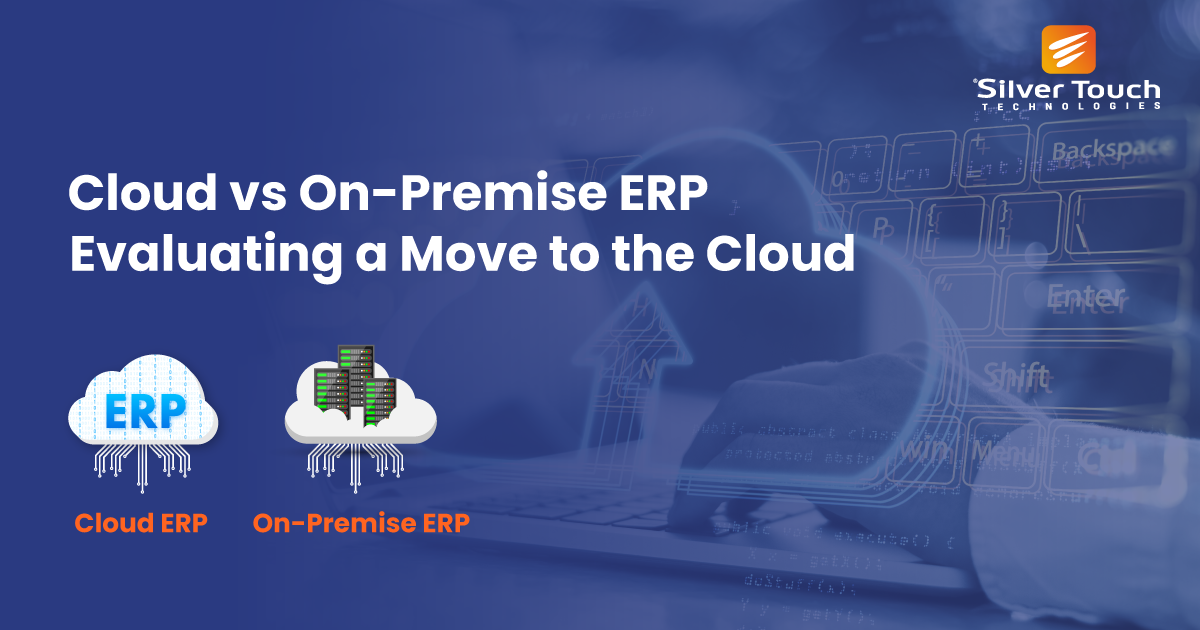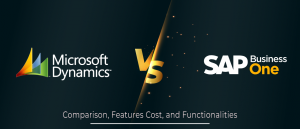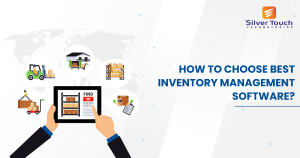The conversation around cloud ERP vs. on-premise ERP is louder than ever. Companies have realised the urgent need to install an intelligent business management system for business growth. Still, many struggle to choose between on-premise solutions and cloud solutions.
This article will help you choose the correct mode of deployment.
What are Cloud-based and On-premise ERP Systems?
On-premise ERP deployment is the process of installing and configuring business management software on the company’s infrastructure. The data and hardware are stored on the company server, and your IT team has to manage the software. In the case of an on-premise ERP, you have to purchase a license or copy of the ERP before using it.
On the other hand, a cloud-based ERP is a scalable and flexible business management tool hosted on the vendor’s server. These are not installed on the on-premise infrastructure. Cloud-based solutions are termed SaaS solutions or software as a service.
These systems can become the backbone of small and mid-sized companies, seamlessly integrating with other tools and automating workflows. You can also access real-time data. The definitions clearly state the distinctions between on-premise ERP vs. cloud ERP. Each system has its pros and cons. However, the following points break down the main differences between both.
Key Factors in Choosing On-Premise vs. Cloud-Based ERP
There are a few determining factors that need to be meticulously evaluated before deciding between cloud-based ERP vs. on-premise. These aspects are:
Ownership Costs
For using on-premise ERP systems, companies have to pay the license charges upfront, as well as manage the ERP-related infrastructure servers, hardware and facilities. Even more so, for on-premise solutions, the IT teams have to spend a significant amount of time, effort and other resources to keep the ERP up and running when you need it. Since the cloud ERP partner will host and maintain the system, you can implement the solution per your needs and access it from any device through the internet.
For cloud-based ERP, initial costs are typically much lower because you simply implement the software to your requirements and then access it through your computer’s internet connection. These solutions also have flexible pricing, and you do not have to bear high upfront costs. Most follow a subscription-based method. Since the subscription cost is already known, you can also plan the cash flows.
The vendor will be responsible for running and maintaining the solution, protecting data, and upgrading the product. The in-house IT teams can focus on innovation and business growth rather than on managing the on-premise ERP. Therefore, the ownership costs of ERP on-premise vs. cloud will largely influence your choice.
System Upgrades and Enhancements
Although on-premise ERP software solutions are customisable, replicating them in future versions can be difficult. In the event of new product updates and enhancements, old customisations are completely wiped out and have to be implemented from scratch again. Fearing the additional workload and costs, companies continue to use outdated systems.
Unlike on-site solutions, cloud ERP systems continuously upgrade the ERP, so you can leverage the latest, most advanced version of the business management tool. The previous customisations and integrations are carried forward to the updated solution without spending a dime.
Deployment Speed
ERP deployment is a detail-oriented job that requires careful planning and can be time-intensive. Nevertheless, the deployment speed for cloud ERP puts it in an advantageous position over on-premise ERP. Cloud ERP installation does not require any additional hardware. Hence, you do not have to waste time and resources in procuring and installing IT infrastructure.
However, on-premise installation does not offer speed. It can take up to 12 months, whereas cloud ERP deployment can be done within 3 to 6 months. With cloud ERP, you can easily roll it out across multiple regions, subsidiaries, and divisions, avoiding the cost associated with those rollouts. Cloud ERP solutions are easier to scale, and as the business grows, you can add more users without additional investment. In the case of an on-site ERP solution, investing in new hardware is often necessary.
Besides examining these four factors, you must remember that every organisation is different. Therefore, when choosing between cloud ERP and on-premise ERP, evaluating the advantages and disadvantages of both systems is essential for informed decision-making.
Ready to Elevate your Business Operations? Dive into the Future with Cloud ERP. Transform your Workflows

Advantages of Using On-Premise ERP
There are five advantages of using an on-premise ERP. They are as follows:
Internal Data Compliance: The foremost advantage of implementing an on-premise ERP is that the solution ensures you adhere to strict data privacy policies. This is vital for safeguarding the data you do not want to sync and share.
Existing Infrastructure: Your company can leverage existing servers and other infrastructure by deploying on-premise solutions and saving money.
Custom Integrations: With an on-site ERP, you can enjoy high-level 3rd party integrations, especially if the company needs unique ones. Interlinking with other apps and solutions will help drive greater value through the on-premise module without spending a fortune.
Lower Cost of Ownership: It is true that you have to pay a huge up-front cost when choosing an on-premise ERP. However, you will bear such costs only once. In the long run, such costs can be recovered, and the overall cost of ownership can be low.
Less Dependence on Internet Connections: The team working from the office can access on-premise ERP solutions without a stable Internet connection since the application is already installed on the company’s laptops and PCs.
Disadvantages of Using On-Premise ERP
Some of the limitations of an on-premise ERP solution are:
Slow Deployment: As on-premises ERP systems have to be installed on multiple servers and workstations, the deployment process is often lengthy and slow, taking several months to finish.
On-going Support and Operational Costs: For an on-premises ERP solution, you have to incur recurring maintenance, support and operational costs, including software license charges, upgradation fees and more.
Maintenance Duties: Your IT team will be majorly responsible for maintaining and updating the on-site ERP. If your team lacks knowledge or expertise, it can spell a blunder for your ERP project.
Advantages of Using Cloud ERP Software
The following are the advantages of a cloud-based ERP solution:
Affordability: Cloud ERP installation involves zero upfront costs. Your business can save a significant amount of money as the cloud software follows a monthly subscription model.
Mobility and High Accessibility: A cloud-based ERP solution allows busy teams to stay on top of important events anytime from anywhere and access the system from any device with an internet connection.
Speedy Deployment: Often, deploying a cloud ERP can be a matter of a few weeks or months. It can be deployed quickly and seamlessly without additional investments and prolonged downtimes, in contrast to on-premises systems that can take up to 12 months.
Real-Time Data: Cloud ERP systems provide real-time data to all the stakeholders in the company. Therefore, the work is never hampered due to the inability to access real-time data.
Flexibility and Scalability As your business grows, cloud-based ERPs can easily scale up based on organisational needs. Unlocking a new module, adding new users or integrating the ERP with third-party solutions is a matter of a few clicks.
Disadvantages of Using Cloud ERP Software
Like every other system, cloud solutions also have some drawbacks, such as,
Recurring Payments: Choosing cloud-based ERP means that there is a never-ending monthly expense. Even though the cost of ownership is low, monthly payments can be a drawback.
Less Control: If you want complete control of the ERP solution, cloud deployment may not be an option for you. Since it is hosted on the vendor’s server, you may not have the ultimate control. Additionally, if the vendor’s server is experiencing downtime, it will affect your operations.
Heavy Reliability on the Internet: Although cloud ERPs let you access data at any time from anywhere, they require a stable Internet connection. Without constant connectivity, a cloud ERP is not of much use. Therefore, companies also have to incur high-speed internet charges.
Data Security: In the case of cloud-ERP solutions, data theft and privacy violation is a legitimate concern. The vendor has to take extra precautions to protect the client’s business data.
You May Also Like to Read: Oracle NetSuite vs SAP ERP: Detailed Comparison of Top-Rated ERP
Why Should You Choose Cloud ERP?
If you are looking for a reason for choosing Cloud ERPs, here is one. According to Finance Online, the cost of maintaining on-premise ERP is 30% more than cloud ERP solutions. For small and mid-level companies, budget can be a constraint. Therefore, choosing a cost-effective option gives them the same leverage (if not more) as an on-premise ERP.
The advantages of the cloud ERPs are plenty. It eliminates the need to maintain elaborate systems and servers. Therefore, during cloud implementation, you do not have to invest in new on-premise infrastructure. Your team can access the system from any device at any time. They also get to work with real-time, accurate data that improves decision-making.
Between ERP on the cloud vs on-premise, the choice is clear!
Silver Touch Technologies- The Best Cloud ERP Solution Provider
Implementing a cloud ERP can be challenging, especially when it involves data migration, third-party app integration, and security and compliance issues. It is safe to say that the ERP vendor expertise will play a vital role in Cloud deployment. ERP professionals at Silver Touch Technologies understand your business needs and customise the ERP solution to align with your immediate and long-term goals. Collaborating with us means seamless implementation and integration of your chosen cloud ERP system within the existing infrastructure. Still confused between cloud vs. on-premise ERP? Contact us today!
Conclusion
Cloud ERP’s role in digital transformation will be pivotal as old and new companies use the power of technology in their businesses. Nevertheless, the concerns over compliance, data security and cyber crimes will increase in the future. Implementing cloud ERP can backfire without the right policies. Hence, businesses and ERP partners must join hands to create a safer and more reliable cloud environment.





